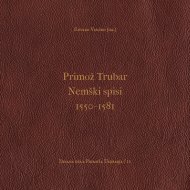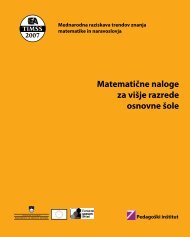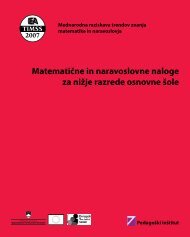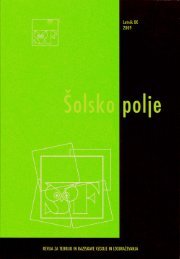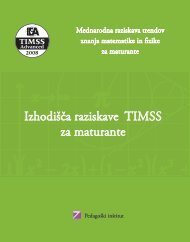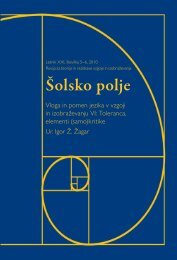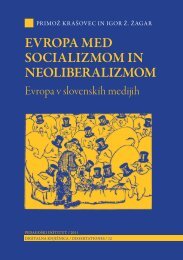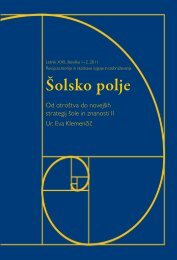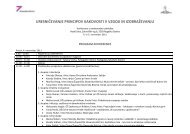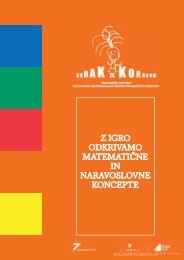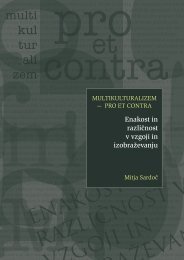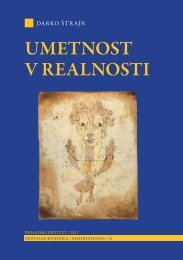86 ŠOLSKO POLJE LETNIK <strong>XX</strong> ŠTEVILKA 5/6particularly pertinent in this regard. It can be argued that TS neglectednegative information precisely because any reference to war crimes couldquestion the myth of Greater Serbia. Furthermore, any critical coverage ofthe past could remind the Serbs about their negative role during the BHwar. TS presented Karadžić’s arrest as a Serbian shift towards the EU – and,in that, positioned a project of »joining the EU« as a positive process, somethingthat brings Serbia closer to the EU, and to its »modern roots.«(B) ArrangementHow has TS »ordered« and »arranged« the main events of Karadžić’s arrest?As argued above, the biography of Karadžić was reported in a linear way,following historical events, but lacking any interpretation of the events. Atypical segment from TS’s program is illustrative here:1. Radovan Karadžić was born in 1945 in Petnjica village, near Nikšić. In1960 he moved to Sarajevo, where he met his wife, Ljiljana. He finishedhis BA in medicine, and became a psychiatrist in a city hospital.He was intensively involved with politics from 1989...On 12 May 1992, he became a president of Republic Srpska. He wasa president until the 30 June 1996. The same year, in 1996, he left thepolitical public life and gave the presidential power to vice-presidentof RS, Biljana Plavšić. In October 2004 he published his book Miraculusof the Night.(22 July 2008, »Radovan Karadžić – Myth and Reality«)Similarly, the events around Karadžić’s arrest followed chronological order,with no additional explanations or interpretations:2. Radovan Karadžić was arrested on the 21 July in Belgrade. After theinitial hearing, the investigative judge of Serbia’s special court on warcrimes Milan Dilparić decided that Karadžić would be extradited toThe Hague Tribunal.A day after the arrest, Serbia’s minister for UN Tribunal relations, RasimLjajić and war crimes prosecutor of the Belgrade County Court,Vladimir Vukčević showed the journalists a new photograph of RadovanKaradžić. He was living in New Belgrade under the false name ofDr. Dragan Dabić, while practicing alternative medicine.
JOURNALISTIC (RE)PRODUCTION OF HISTORY: TELEVIZED COVERAGE OF RADOVAN ...87On the 22 of July, the protests to support Radovan Karadžić were organizedin Belgrade by the Serbian Radical party, and other right-wingorganizations.On the 23 of July, copies of different official materials from SerbianArmy meetings were found in the apartment where Radovan Karadžićwas hiding.On the 29 of July, dozens of supporters of Serbian Radical Party showedtheir solidarity with Radovan Karadžić, while protesting againsthis arrest on the Belgrade’s Republic Square.In the morning, the lawyer of the former president of the Republicof Srbska claimed that he did not file an appeal against Karadžić’stransfer to the international war crimes tribunal in The Hague. He willattempt to prolong Karadžić’s transfer. (30 July 2008, TV News)First, then, the analysis shows that the coverage of the events of Karadžić’slife, arrest and legal process followed a chronological order, representingthese events as a sequence of connected and linear events. This form ofreconstruction gives the events a specific meaning, since it differs fromnews-story conventions (presenting time-movement in terms of causesand effects). It also avoids explicit interpretation of any events (Bird andDardenne, 1997), because it doesn’t follow time in terms of cause and effect.Journalists use this chronological narration as a strategic ritual in reporting,since it insulates them from accusations of bias or distortion (Birdand Dardenne, 1997; Johnson-Cartee, 2005). The journalists attempt to legitimizetheir »objectivity« through presentation of facts, reliable sources,expert opinion, accuracy and fairness. However, while using strategic ritualin reporting, objective treatment of fact and deference to official sources,journalists function as uncritical conduits for military and governmentopinion instead of fulfilling their normative role as »watchdogs«.The second most important effect of chronological narrative, besidesnaturalization, is the dramatization of events, whereby journalists attempt toattract viewers and with that, high ratings. Also for Serbian media, sensationaltendencies proved commercially expedient, and commercial imperatives ofmedia organisations generate cultural content that reduce social and culturalcomplexities. When TS reported crucial events from either Karadžić’s politicalcareer and/or his arrest, TS has used the so-called »arrangement« principlein order to construct a belief in objective reporting: it created a linear connectionbetween the events to offer only one interpretation of the events. In that,
- Page 3:
VSEBINA LETNIK XX ŠTEVILKA 5/6 Z
- Page 7 and 8:
UVODNA NOTICAIgor Ž. ŽagarTole pi
- Page 9 and 10:
ZA KAJ GRE V KAD - PREGLEDZGODOVINE
- Page 11 and 12:
ZA KAJ GRE V KAD - PREGLED ZGODOVIN
- Page 13:
ZA KAJ GRE V KAD - PREGLED ZGODOVIN
- Page 17 and 18:
ZA KAJ GRE V KAD - PREGLED ZGODOVIN
- Page 19 and 20:
ZA KAJ GRE V KAD - PREGLED ZGODOVIN
- Page 21 and 22:
ZA KAJ GRE V KAD - PREGLED ZGODOVIN
- Page 23 and 24:
ZA KAJ GRE V KAD - PREGLED ZGODOVIN
- Page 25 and 26:
ZA KAJ GRE V KAD - PREGLED ZGODOVIN
- Page 27 and 28:
DISKURZ: FOUCAULT, LACLAU TERZAPOPA
- Page 29 and 30:
DISKURZ: FOUCAULT, LACLAU TER ZAPOP
- Page 31 and 32:
DISKURZ: FOUCAULT, LACLAU TER ZAPOP
- Page 33 and 34:
DISKURZ: FOUCAULT, LACLAU TER ZAPOP
- Page 35 and 36:
DISKURZ: FOUCAULT, LACLAU TER ZAPOP
- Page 37 and 38: DISKURZ: FOUCAULT, LACLAU TER ZAPOP
- Page 39 and 40: DISKURZ: FOUCAULT, LACLAU TER ZAPOP
- Page 41 and 42: DISKURZ: FOUCAULT, LACLAU TER ZAPOP
- Page 43 and 44: DISKURZ: FOUCAULT, LACLAU TER ZAPOP
- Page 45 and 46: DISKURZ: FOUCAULT, LACLAU TER ZAPOP
- Page 47 and 48: DISKURZ: FOUCAULT, LACLAU TER ZAPOP
- Page 49 and 50: TOPOI IN CRITICAL DISCOURSE ANALYSI
- Page 51 and 52: TOPOI IN CRITICAL DISCOURSE ANALYSI
- Page 53 and 54: TOPOI IN CRITICAL DISCOURSE ANALYSI
- Page 55 and 56: TOPOI IN CRITICAL DISCOURSE ANALYSI
- Page 57 and 58: TOPOI IN CRITICAL DISCOURSE ANALYSI
- Page 59 and 60: TOPOI IN CRITICAL DISCOURSE ANALYSI
- Page 61 and 62: TOPOI IN CRITICAL DISCOURSE ANALYSI
- Page 63 and 64: TOPOI IN CRITICAL DISCOURSE ANALYSI
- Page 65 and 66: TOPOI IN CRITICAL DISCOURSE ANALYSI
- Page 67 and 68: TOPOI IN CRITICAL DISCOURSE ANALYSI
- Page 69 and 70: TOPOI IN CRITICAL DISCOURSE ANALYSI
- Page 71 and 72: TOPOI IN CRITICAL DISCOURSE ANALYSI
- Page 73 and 74: TOPOI IN CRITICAL DISCOURSE ANALYSI
- Page 75 and 76: TOPOI IN CRITICAL DISCOURSE ANALYSI
- Page 77 and 78: University of Queensland, Centre fo
- Page 79 and 80: JOURNALISTIC (RE)PRODUCTION OF HIST
- Page 81 and 82: JOURNALISTIC (RE)PRODUCTION OF HIST
- Page 83 and 84: JOURNALISTIC (RE)PRODUCTION OF HIST
- Page 85 and 86: JOURNALISTIC (RE)PRODUCTION OF HIST
- Page 87: JOURNALISTIC (RE)PRODUCTION OF HIST
- Page 91 and 92: JOURNALISTIC (RE)PRODUCTION OF HIST
- Page 93 and 94: JOURNALISTIC (RE)PRODUCTION OF HIST
- Page 95 and 96: JOURNALISTIC (RE)PRODUCTION OF HIST
- Page 97 and 98: JOURNALISTIC (RE)PRODUCTION OF HIST
- Page 99 and 100: JOURNALISTIC (RE)PRODUCTION OF HIST
- Page 101 and 102: JOURNALISTIC (RE)PRODUCTION OF HIST
- Page 103 and 104: THE VOICE OF AN AGENDA-SETTINGAUTHO
- Page 105 and 106: THE VOICE OF AN AGENDA-SETTING AUTH
- Page 107 and 108: THE VOICE OF AN AGENDA-SETTING AUTH
- Page 109 and 110: THE VOICE OF AN AGENDA-SETTING AUTH
- Page 111 and 112: THE VOICE OF AN AGENDA-SETTING AUTH
- Page 113 and 114: THE VOICE OF AN AGENDA-SETTING AUTH
- Page 115 and 116: THE VOICE OF AN AGENDA-SETTING AUTH
- Page 117 and 118: THE VOICE OF AN AGENDA-SETTING AUTH
- Page 119 and 120: THE VOICE OF AN AGENDA-SETTING AUTH
- Page 121 and 122: THE VOICE OF AN AGENDA-SETTING AUTH
- Page 123 and 124: THE VOICE OF AN AGENDA-SETTING AUTH
- Page 125 and 126: THE VOICE OF AN AGENDA-SETTING AUTH
- Page 127 and 128: THE VOICE OF AN AGENDA-SETTING AUTH
- Page 129 and 130: THE VOICE OF AN AGENDA-SETTING AUTH
- Page 131 and 132: THE VOICE OF AN AGENDA-SETTING AUTH
- Page 133 and 134: THE VOICE OF AN AGENDA-SETTING AUTH
- Page 135 and 136: ‘68 KOT HKRATNA KRIZA EVROPSKEGAZ
- Page 137 and 138: ‘68 KOT HKRATNA KRIZA EVROPSKEGA
- Page 139 and 140:
‘68 KOT HKRATNA KRIZA EVROPSKEGA
- Page 141 and 142:
‘68 KOT HKRATNA KRIZA EVROPSKEGA
- Page 143 and 144:
‘68 KOT HKRATNA KRIZA EVROPSKEGA
- Page 145 and 146:
‘68 KOT HKRATNA KRIZA EVROPSKEGA
- Page 147 and 148:
‘68 KOT HKRATNA KRIZA EVROPSKEGA
- Page 149 and 150:
‘68 KOT HKRATNA KRIZA EVROPSKEGA
- Page 151 and 152:
‘68 KOT HKRATNA KRIZA EVROPSKEGA
- Page 153 and 154:
‘68 KOT HKRATNA KRIZA EVROPSKEGA
- Page 155 and 156:
‘68 KOT HKRATNA KRIZA EVROPSKEGA
- Page 157 and 158:
‘68 KOT HKRATNA KRIZA EVROPSKEGA
- Page 159 and 160:
POVZETKI/ABSTRACTSZA KAJ GRE V KAD
- Page 161 and 162:
POVZETKI / ABSTRACTS159NOVINARSKA (
- Page 163 and 164:
POVZETKI / ABSTRACTS161‘68 AS PAR
- Page 165 and 166:
AVTORJI/AUTHORSRuth WodakRuth Wodak
- Page 168 and 169:
166 ŠOLSKO POLJE LETNIK XX ŠTEV
- Page 170 and 171:
168 ŠOLSKO POLJE LETNIK XX ŠTEV
- Page 172:
ZAHVALARevija Šolsko polje izhaja



